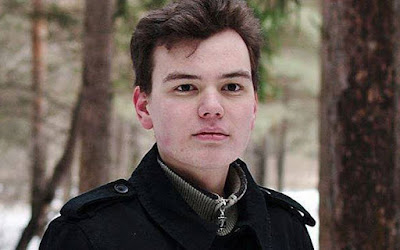28 December 2015
Vlad Kolesnikov was found dead after taking
overdose on Christmas Day, following a public backlash described by rights
groups as 'hideous' over his criticism of Russian policy.
An 18-year-old Russian boy who suffered a
major public backlash after criticising Russia's policies in Ukraine has
committed suicide.
Vlad Kolesnikov took an overdose of
undisclosed pills on Christmas Day, having sent a suicide note to a journalist
friend over the messenger Telegram just hours prior.
“If I don't get in touch in the next 2-6
days, you can write about me. It means I'm dead. I took a lethal dose,” a
message sent from Mr Kolesnikov to Radio Liberty journalist Claire Bigg read,
according to the publication.
Hours after that message, police in
Russia's Samara region discovered the teenager's body.
Mr Kolesnikov's death has triggered an
uproar among human rights activists in Ukraine and Russia, who say the
fanatical pro-Kremlin atmosphere in “Putin's Russia” led to the bullying and
abuse that pushed the young activist over the edge.
The Twitter hashtag #VladKolesnikov was
trending in Russia for days after his death, and even top Ukrainian officials
expressed their condolences.
Alexander Scherba, a representative for
Ukraine's Foreign Ministry, said there should be a “place in heaven … for those
ready to go against the weak will of millions of their fellow countrymen” in
comments on Twitter.
Halya Coynash of the Kharkiv Human Rights
Protection Group, a Ukraine-based partner of Amnesty International and the
Moscow Helsinki Group, called the situation “hideous” and said Mr Kolesnikov's
death was not the result of anything as benign as teenage bullying.
“It has become dangerous for anybody to
express opposition to Russian aggression … and he was just a boy. With a family
who was ashamed of him,” Ms Coynash told The Telegraph. Mr Kolesnikov's
grandfather, a former KGB agent and a supporter of President Vladimir Putin,
exiled him from his home in the summer, after the teenager first made his stance
on the Ukraine conflict clear.
Russia's official response on the matter
has been minimal.
Russian investigators have sought to play
down the incident, saying in an official statement on Dec. 25 that Mr
Kolesnikov's death was an accident caused by drinking too much alcohol and
mixing it with drugs and energy drinks.
In the weeks leading up to his death,
however, the young Mr Kolesnikov had made it very clear that he had fallen
victim to a harassment campaign for his outspoken political views, telling Ms
Bigg that he was consistently beaten up and harassed and that the only way out
he saw was suicide.
Mr Kolesnikov shot to fame last summer
after wearing a “Return Crimea” T-shirt to his school in Podolsk, a move which
prompted his school to expel him and the police to pay him a visit asking where
he got the shirt, according to Radio Liberty. Later, he showed up to a military
enlistment office playing Ukraine's national anthem on his phone, prompting
enlistment officers to diagnose him with a “personality disorder”.
Weeks before his death, Mr Kolesnikov said
an appeal to police had been met only with further abuse from police officers,
who told him they would not help him and would themselves like to beat him up
for his behaviour.
According to Ms Bigg, shortly before his
death, efforts were under way to relocate Mr Kolesnikov with the help of
foreign nongovernmental organisations. Ms Bigg did not specify which
organisations were involved, but several people close to the matter said they
could not provide any details as it might jeopardise the safety of one of Mr
Kolesnikov's close friends, who was also involved in pro-Ukrainian activism and
remains on police radar.
Allison Quinn

